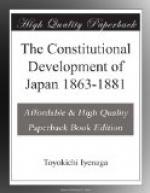“It was in the summer of 1853 that an individual named Perry, who called himself the envoy of the United States of America, suddenly arrived at Uraga, in the Province of Sagami, with four ships of war, declaring that he brought a letter from his country to Japan and that he wished to deliver it to the sovereign. The governor of the place, Toda Idzu No Kami, much alarmed by this extraordinary event, hastened to the spot to inform himself of its meaning. The envoy stated, in reply to questions, that he desired to see a chief minister in order to explain the object of his visit and to hand over to him the letter with which he was charged. The governor then despatched a messenger on horseback with all haste to carry this information to the castle of Yedo, where a great scene of confusion ensued on his arrival. Fresh messengers followed, and the Shogun Iyeyoshi, on receiving them, was exceedingly troubled, and summoned all the officials[2] to a council. At first the affair seemed so sudden and so formidable that they were too alarmed to open their mouths, but in the end orders were issued to the great clans to keep strict watch at various points on the shore, as it was possible that the ‘barbarian’ vessels might proceed to commit acts of violence. Presently a learned Chinese scholar was sent to Uraga, had an interview with the American envoy, and returned with the letter, which expressed the desire of the United States to establish friendship and intercourse with Japan, and said, according to this account, that if they met with a refusal they should commence hostilities. Thereupon the Shogun was greatly distressed, and again summoned a council. He also asked the opinion of the Daimios. The assembled officials were exceedingly disturbed, and nearly broke their hearts over consultations which lasted all day and all night. The nobles and retired nobles in Yedo were informed that they were at liberty to state any ideas they might have on the subject, and, although they all gave their opinions, the diversity of propositions was so great that no decision was arrived at. The military class had, during a long peace, neglected military arts; they had given themselves up to pleasure and luxury, and there were very few who had put on armor for many years, so that they were greatly alarmed at the prospect that war might break out at a moment’s notice, and began to run hither and thither in search of arms. The city of Yedo and the surrounding villages were in a great tumult. And there was such a state of confusion among all classes that the governors of the city were compelled to issue a notification to the people, and this in the end had the effect of quieting the general anxiety. But in the castle never was a decision further from being arrived at, and, whilst time was being thus idly wasted, the envoy was constantly demanding an answer. So at last they decided that it would be best to arrange the affair quietly, to give the foreigners the articles




